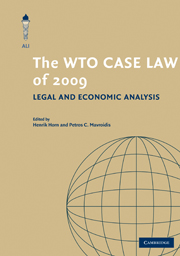Book contents
- Frontmatter
- Contents
- Foreword
- Introduction
- US Compliance with WTO Rulings on Zeroing in Anti-Dumping
- United States – Continued Existence and Application of Zeroing Methodology: the end of Zeroing?
- Incomplete Harmonization Contracts in International Economic Law: Report of the Panel, China – Measures Affecting the Protection and Enforcement of Intellectual Property Rights, WT/DS362/R, adopted 20 March 2009
- Comment
- Trading Cultures: Appellate Body Report on China–Audiovisuals
- Comment
- ‘Optimal’ Retaliation in the WTO – a commentary on the Upland Cotton Arbitration
Trading Cultures: Appellate Body Report on China–Audiovisuals
(WT/DS363/AB/R, adopted 19 January 2010)
Published online by Cambridge University Press: 05 December 2011
- Frontmatter
- Contents
- Foreword
- Introduction
- US Compliance with WTO Rulings on Zeroing in Anti-Dumping
- United States – Continued Existence and Application of Zeroing Methodology: the end of Zeroing?
- Incomplete Harmonization Contracts in International Economic Law: Report of the Panel, China – Measures Affecting the Protection and Enforcement of Intellectual Property Rights, WT/DS362/R, adopted 20 March 2009
- Comment
- Trading Cultures: Appellate Body Report on China–Audiovisuals
- Comment
- ‘Optimal’ Retaliation in the WTO – a commentary on the Upland Cotton Arbitration
Summary
Abstract: In China–Audiovisuals, a series of Chinese restrictions on the importation and distribution of certain ‘cultural’ or ‘content’ goods and services were found to violate GATT, GATS, and China's Accession Protocol. This paper reviews the definition of what is a ‘good’ (is a ‘film’ a good or a service?) and the extent to which GATT Article XX exceptions can justify violations under WTO instruments other than the GATT itself. We argue that trade volumes are unlikely to significantly rise as a result of this ruling as it does not affect China's right to keep out foreign films and publications if China finds them objectionable. However, foreign producers of audiovisuals can now gain potentially large economic rents, by being able to export and distribute their products into the Chinese market. Finally, we discuss the issue of the protection of cultural goods and review the recent literature on trade and culture that has put forward economic arguments to justify, under some conditions, the protection of cultural goods.
Summary of the dispute
China–Audiovisuals is a complex and broad-based dispute filed by the United States in April 2007 against a series of Chinese restrictions on the importation and distribution of certain ‘cultural’ or ‘content’ goods and services: (i) reading materials such as books, periodicals, and electronic publications; (ii) audiovisual home-entertainment products such as DVDs; (iii) sound recordings; and (iv) films for theatrical release.
- Type
- Chapter
- Information
- The WTO Case Law of 2009Legal and Economic Analysis, pp. 95 - 118Publisher: Cambridge University PressPrint publication year: 2011
- 1
- Cited by

